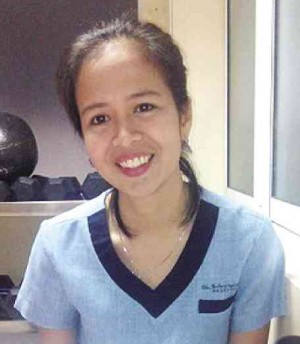CEBU CITY—Increasing market demand is driving Cebu Doctors University (CDU) in Mandaue City, Cebu province, to expand its Department of Speech and Language Pathology (DSLP).
Genevieve Roble, the university’s DSLP chair, said more and more patients, particularly victims of stroke and vehicular accidents, were now seeking the assistance of speech and language therapists for their full and speedy recovery.
Even parents of children who faced such problems as developmental delays and autism were also seeking the services of therapists, she said.
“Language is not just an art. There is also a science to it,” Roble said.
The CDU DSLP chair, who obtained her Bachelor of Science in Speech Pathology degree from the University of the Philippines in Manila, said she was looking at the possibility of linking Speech Language Pathology (SLP) with Cebu’s education system.
“[S]peech therapists can be employed in schools because there are also children who are at risk there. There are children who are labeled ki-at pero dili lang di-ay sila makasabot sa lessons (unruly but, actually, they cannot understand the lesson),” she said
CDU was the first school to offer the five-year SLP degree course in Visayas and Mindanao. The school started offering SLP in June 2012 with 56 enrollees.
As of the second semester of the current school year, SLP enrollment was 133. Cebuano students apparently were beginning to see the potential of an SLP degree.
Some students are also taking SLP as a preparatory course to medicine.
Roble said their students got a feel of actual practice during their internship at the SLP clinic located at the Department of Physical and Rehabilitation Medicine Center of Cebu Doctors University Hospital (CDUH) on Osmeña Boulevard in Cebu City.
At present, Cebu has only six professionals offering speech and language pathology services. Of the six, only Roble is from Cebu. The others are from Manila and other parts of the Visayas.
Roble said four, including herself, were connected with CDUH. The other two had their own private clinics in Cebu City.
“If people know that we exist, we can address the market demand for the service. The reason why people do not get the service they need is because they do not know that we exist,” Roble said.
DSLP is under CDU’s College of Rehabilitative Sciences, which also offers Respiratory Therapy, Occupational Therapy and Physical Therapy courses.
Dedicated to the understanding of normal communication processes and the application of knowledge for the identification, treatment and prevention of communication disorders in children and adults, SLP draws on linguistics, psychology, the biological and physical sciences to study normal communication and speech and language disorders.
Those involved in the field of Communicative Sciences and Disorders seek to understand and minimize the impact of disordered speech, language, hearing and swallowing problems on a person’s educational, social or vocational development. They offer help not only to the patient, but also the family and caregivers.
Roble said speech difficulty was common among children experiencing developmental delays and those with autism and cleft palates. Therapy was also advised for adults who had a stroke or were involved in vehicular accidents to hasten their speech recovery, she said.
Even those who stuttered or had voice problems visited their clinic, Roble said.
“There is a demand for speech therapists but there are few professionals offering the service,” she said.
Teachers and therapists
Roble said four instructors, including herself, taught the SPL course at CDU. They also held clinics at CDUH.
At CDUH, she said they attend to five to six in-patients and walk-in clients every day. In some instances, they also provide home service to patients who are bedridden.
Roble said they hold clinics on Monday, Wednesday and Thursday, 8 a.m. to 5 p.m. But Roble said a visit to the clinic did not mean the patient would immediately undergo therapy.
Patients are screened first, she said, to assess their needs and identify the required interventions.
Roble said development delays in children, for example, were caused by multiple factors. It could be structural or caused by a problem with the child’s tongue. It could also be caused by the environment.
She said children, who grew up in the care of household help because parents both work, were prone to suffer from development delays that could be addressed by therapy.
A therapy session at CDUH would cost P500 to P1,000, Roble said. A one-hour session includes 45 minutes of actual therapy at their clinic, which is decorated like a playroom.
“We interact with our patients during our sessions. We do not only rely on the use of gadgets,” she said.
The remaining 15 minutes is devoted to consultation with the patient’s parents or family members, she said.
“We involve the family because they are the ones who stay with the patients 24 hours a day. We share with them techniques on how to communicate better with the patient,” Roble said.
The duration of the therapy is determined by the patient’s need, she said. Stroke or accident victims, for example, would need three to four months therapy, while children with autism might have to undergo long-term therapy, Roble said.


